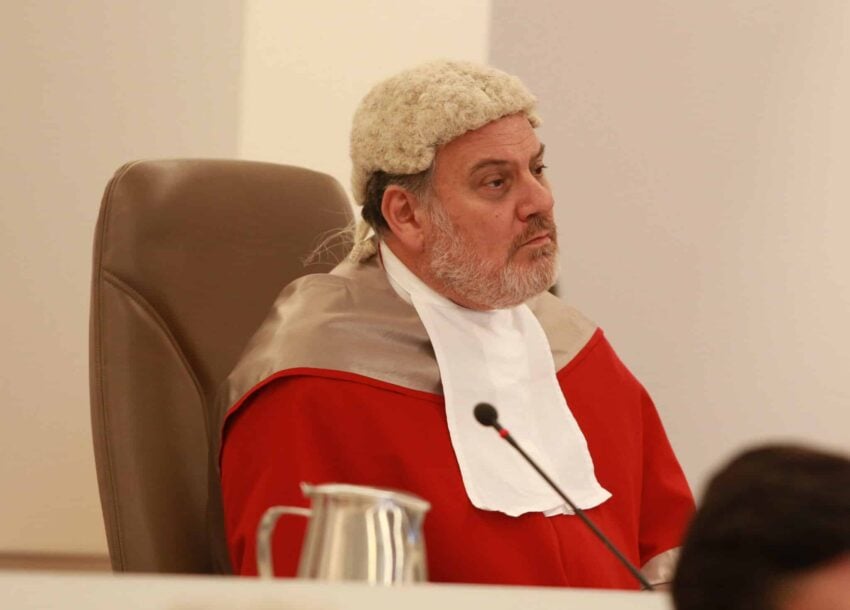
A letter from Australia’s most senior religious figures expressing “deep disappointment” with the scope of the Australian Law Reform Commission’s inquiry into religious schools “had very little impact” on the thinking of the inquiry’s commissioner, NSW Supreme Court Judge Justice Stephen Rothman.
Justice Rothman said the authors of the 13 February letter—including Archbishop Anthony Fisher OP and the most senior clergy of the Anglican and Orthodox churches, alongside top Jewish and Muslim leaders—had disappointed him by raising objections in the media.
He also said he thought the authors had misunderstood some of what was proposed by the ALRC in its 27 January consultation paper.
Justice Rothman made the remarks following an address to a religious freedom conference held at the University of Notre Dame, Sydney, on 24 February.
“The answer is, [the letter] had very little impact upon my thinking,” he said in response to a question from The Catholic Weekly.
“I was disappointed that these issues weren’t raised with us, rather than in the press. That’s certainly the case.
“And I was disappointed given I knew and had met with most of the people who had signed the letter, that they just didn’t pick up the phone, because they had been invited so to do.”
According to the consultee list for the inquiry, only four of the signatories of the letter received official consultations: Peter Wertheim from the Executive Council of Australian Jewry; Adel Salman, president of the Islamic Council of Victoria; and Christian think tankers Mark Sneddon and Mike Sothon.
While members of the National Catholic Education Commission were consulted, no Catholic bishop is recorded on the list; Michael Stead, of the Anglican Diocese of Sydney, appears to be the only Christian bishop who was consulted.
“But I understand the issue, although I frankly think the authors have misunderstood some of the exemptions and provisos in the proposals,” Justice Rothman continued.
“The proposals were framed to reflect international law in some respects, and otherwise to really focus everybody’s attention on what is needed—that is, if these proposals were put forward, what exemption would you need, and how would it be framed?”
The ALRC inquiry is investigating exemptions to anti-discrimination laws that allow religious schools to “discriminate” against students and staff on the basis of sexual orientation, gender identity, marital status and other attributes in accordance with religious beliefs.
The faith leaders’ letter objected strongly to proposed “severe limits” on religious schools’ right to preference members of their own faith when employing staff.
“The ALRC is proposing to greatly restrict this freedom by requiring religious schools to employ teachers who may not share or support the religious beliefs of the organisation, and whose employment can only be terminated where they “actively undermine” the religious ethos of the school,” the letter read.
Justice Rothman said the faith leaders’ focus on employment rather than discrimination was unexpected.
“Interestingly, the letter deals almost overwhelmingly with the ability to choose people of faith rather than the indirect discrimination that may occur in relation to people because of an individual attribute such as sexuality, or sexual preference or the like—which we consider to be the more problematic area,” he said.
“So I suppose in that sense it did affect my thinking, because I saw the main issue of the religious communities to be different from what I thought was their main issue. But I suspected I would come to that sort of view in any event.”
The ALRC inquiry received more than 2000 survey responses and over 150 submissions, Justice Rothman said.
He said the volume of material may mean the ALRC will be unable to meet its 21 April deadline.
“It may be, because we also have to look at the volume of material, we actually won’t be able to comply with the time limit of 21 April,” he said.
“But I’m hopeful it won’t be much longer than that.”
Justice Rothman’s remarks followed a wide-ranging address on the relationship between religious traditions, education, character and justice.
Top constitutional law expert Professor Nicholas Aroney, and the president of Campion College, Dr Paul Morrissey, joined Justice Rothman in presenting papers on the same topic.
